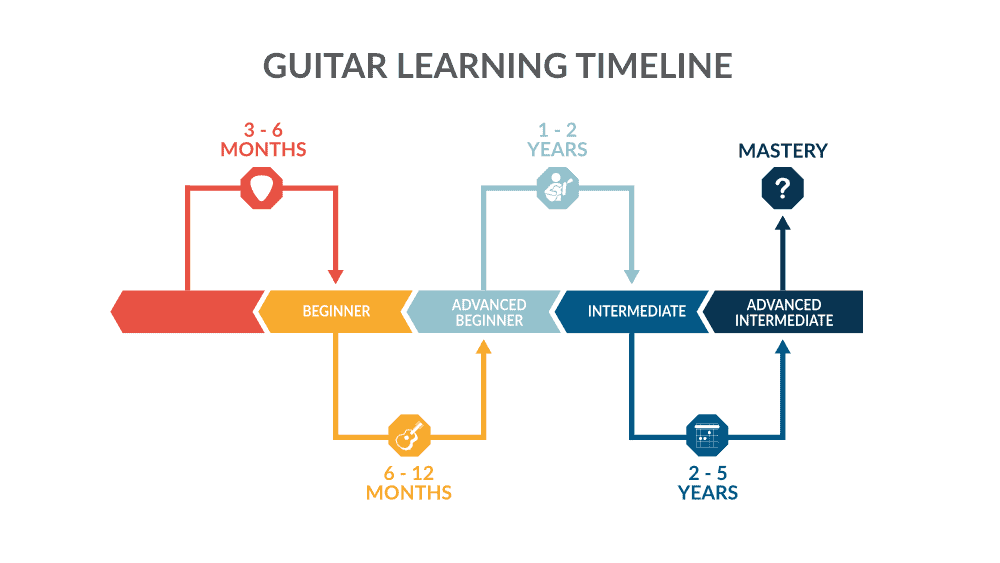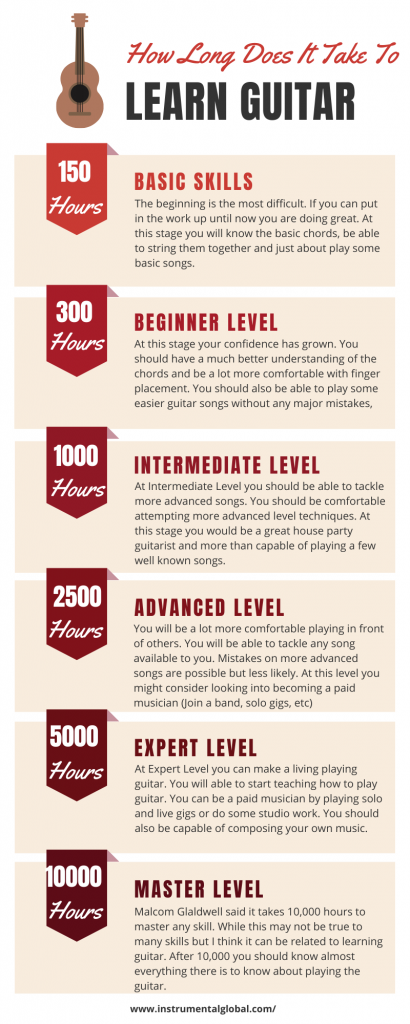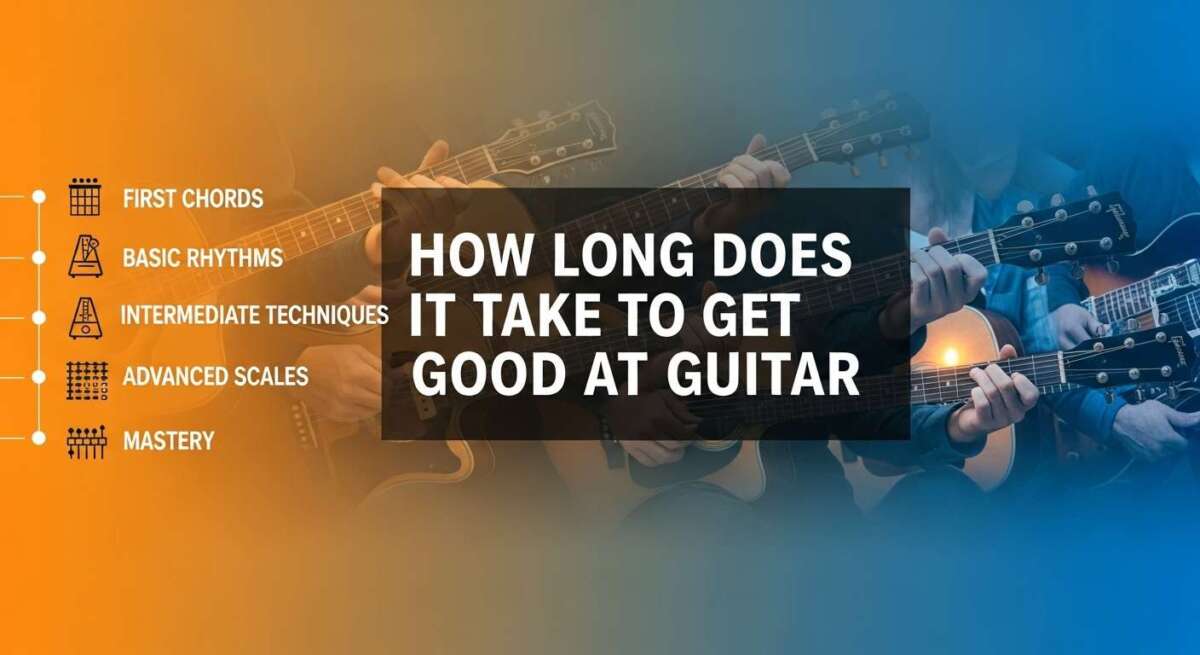How long does it take to get good at guitar? If you’ve picked up a guitar and wondered when you’ll finally sound like the players you admire, you’re not alone.
The truth is, everyone’s journey is different, and “good” means something unique to you. But imagine reaching a point where you confidently strum your favorite songs, impress friends, or even play on stage. How soon can that happen? You’ll discover the real factors that affect your progress, smart practice tips to speed up learning, and what milestones to expect along the way.
Ready to find out how to get there faster and enjoy every step? Keep reading—you might be closer to rocking out than you think.
Time-frames For Skill Levels
Understanding how long it takes to get good at guitar depends on the skill level you aim to reach. Each stage of learning requires different amounts of time and practice. Progress happens step by step. Knowing these time-frames helps set clear goals and keeps motivation high.
Basic Chords And Songs
Learning basic chords usually takes about one to three months. Beginners start with simple shapes like G, C, and D. Playing easy songs becomes possible after practicing chord changes. Daily practice of 15 to 30 minutes speeds up progress. Focus on clean sound and smooth transitions. This stage builds the foundation for all future skills.
Intermediate Techniques
Reaching an intermediate level often takes six months to a year. This stage includes learning barre chords and fingerpicking patterns. Players start practicing scales and simple solos. Timing and rhythm improve significantly. Practice sessions grow longer, around 30 to 60 minutes daily. Consistency is key to mastering these new techniques. At this point, players can play many popular songs with confidence.
Advanced Playing And Performance
Advanced skills typically develop after one to three years of practice. This level involves complex solos, improvisation, and fast playing. Players focus on tone, dynamics, and stage presence. Practice time may increase to one hour or more each day. Many also study music theory to deepen their understanding. Performing live becomes easier and more natural. Patience and dedication are essential to reach this stage.
Factors Affecting Progress
Progress in learning guitar depends on several key factors. Each factor influences how fast you improve. Understanding these can help you plan your practice and reach your goals efficiently.
Practice Frequency And Duration
How often you practice matters a lot. Daily practice leads to better results than irregular sessions. Even short practice times, like 15 to 30 minutes daily, help build skills steadily.
Long sessions once a week are less effective than consistent shorter sessions. Regular practice keeps your fingers and brain engaged. It helps build muscle memory faster.
Quality Of Practice Sessions
Practicing well beats practicing long without focus. Concentrate on difficult parts instead of playing songs mindlessly. Use a metronome to keep time and improve rhythm.
Break down songs into small sections. Repeat challenging parts slowly and increase speed gradually. This focused approach makes practice more productive and enjoyable.
Setting Clear Goals
Goals give your practice direction and motivation. Set simple targets like learning a new chord or a short song each week. Clear goals help measure progress and keep you motivated.
Write down your goals and track your improvement. Adjust goals as you improve. This keeps your practice challenging but achievable.
Essential Skills To Focus On
Getting good at guitar takes focus on a few essential skills. These skills build the foundation for all types of playing. Concentrate on them to improve steadily and enjoy the process.
Core Chords And Scales
Start by learning basic chords like major, minor, and power chords. These chords appear in many songs and styles. Practice simple scales such as the pentatonic scale. Scales help with finger strength and soloing skills. Knowing these basics allows you to play many songs quickly.
Rhythm And Timing
Good rhythm is crucial for playing with others or backing tracks. Use a metronome to keep steady time. Practice strumming patterns and simple rhythms regularly. Timing improves your overall sound and helps you stay in sync with music.
Chord Transitions
Switching chords smoothly is key to playing songs well. Practice changing between core chords slowly at first. Gradually increase speed as your fingers get used to the shapes. Clean chord transitions make your playing sound polished and confident.

Credit: tomasmichaud.com
Practice Strategies
Practice strategies shape how quickly you improve on guitar. Focused and efficient practice beats long, unfocused hours. Smart methods help build skills steadily and avoid frustration. Below are key strategies to make your practice time count.
Smart Practice Over Hard Practice
Playing for many hours does not always mean better progress. Smart practice means setting clear goals each session. Work on weak spots instead of playing only what feels easy. Short, focused sessions often yield faster improvement. Quality beats quantity every time.
Using A Metronome
A metronome helps keep your timing steady. Start slow and increase speed only when you play cleanly. This tool trains your internal clock and builds rhythm skills. Consistent timing makes all songs sound better and more professional.
Breaking Down Difficult Passages
Split hard parts into small sections. Practice each section slowly until it feels natural. Repeat sections before connecting them together. This method prevents overwhelm and builds muscle memory. Patience here leads to smoother playing later.
Keeping A Practice Journal
Write down what you practice and your progress each day. Note which exercises help most and what remains tricky. A journal tracks improvement and guides future practice. Reviewing past entries boosts motivation and focus.
Common Challenges And Solutions
Learning guitar brings many challenges. These obstacles can slow progress. Understanding common problems helps players find solutions. This section explains key challenges and how to tackle them effectively. Overcoming these issues leads to steady improvement and more enjoyment.
Overcoming Plateaus
Plateaus happen when progress feels stuck. Skills may not improve despite practice. Changing practice routines can help. Try new songs or techniques. Focus on weak spots with targeted exercises. Record yourself to track subtle gains. Small changes break the boredom and boost growth.
Building Finger Strength And Dexterity
Finger strength and dexterity grow with consistent practice. Start with simple finger exercises daily. Use scales and chord changes to train fingers. Stretch fingers gently before playing. Avoid tension to prevent injury. Over time, fingers move faster and smoother. Patience is key for strong, flexible hands.
Maintaining Motivation
Staying motivated is tough for many learners. Set small, clear goals to stay focused. Celebrate each achievement, no matter how small. Play songs you enjoy to keep interest high. Join groups or find a practice buddy. Taking breaks prevents burnout. Motivation fuels regular practice and steady progress.

Credit: www.youtube.com
Resources For Learning
Finding the right resources shapes how fast you learn guitar. Good resources keep you motivated and guide your practice. They help you understand music basics and techniques step-by-step. Here are some key options to explore.
Online Tutorials And Videos
Online tutorials offer lessons for all skill levels. Videos show finger positions and strumming clearly. You can pause and replay lessons anytime. Many sites provide free content and structured courses. This flexibility fits any schedule and learning pace.
Guitar Lessons And Courses
Private lessons provide personal feedback and tailored guidance. Teachers correct mistakes early and build strong habits. Group classes create a social learning environment. Courses often include practice plans and progress tracking. This approach suits learners who want steady improvement.
Community And Forums
Online forums connect you with other guitar players worldwide. You can ask questions and share tips. Communities offer support and motivation during tough times. Many forums have sections for beginners and advanced players. Engaging with others speeds up learning and keeps it fun.
Frequently Asked Questions
How Long Does It Take To Get Good On The Guitar?
Getting good at guitar typically takes 6 months to a year with consistent daily practice. Focus on chords, scales, and rhythm. Quality practice beats quantity. Progress varies by dedication and learning methods.
What Is The 80 20 Rule For Guitar?
The 80/20 rule for guitar means focusing on 20% of skills that yield 80% of results. Prioritize essential chords, scales, and rhythm. Practice smart by targeting weaknesses and using effective exercises. This approach accelerates progress and builds strong foundational playing skills.
What Is The 10000 Hour Rule For Guitar?
The 10,000 hour rule for guitar means practicing about 10,000 hours to reach expert skill. Consistent, focused practice speeds progress.
How Long Will It Take To Learn Guitar?
Learning guitar typically takes 3 to 6 months for basic skills with regular practice. Mastery requires years of dedication. Consistent, focused practice speeds progress. Results vary by individual goals, practice quality, and effort. Set realistic expectations and enjoy the learning journey.
Conclusion
Getting good at guitar takes time, patience, and steady practice. Focus on key chords and rhythms first. Practice daily, even if only for a short time. Track your progress to see real improvement. Everyone learns at a different pace, so stay motivated.
Enjoy the journey and celebrate small wins. With consistent effort, playing well will come naturally. Keep your goals clear and your practice smart. Guitar skills grow bit by bit, so don’t rush. Stay positive, and the results will follow.

Senior Music Reviewer
Alex Carter is a seasoned music reviewer with over a decade of experience in the world of sound and instruments. Passionate about helping musicians and enthusiasts make informed choices, he brings sharp insights and in-depth knowledge to every review. From classical instruments to modern gear, Alex combines technical expertise with a love for music to deliver content that resonates with readers.
As a Senior Music Reviewer and expert author on Tuneluma.com, Alex is dedicated to sharing honest evaluations, practical advice, and thoughtful commentary to guide readers in their musical journey.


Leave a Reply